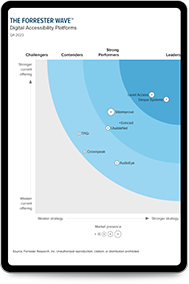6 Advantages of Working with a Web Accessibility Consultant
Jul 12, 2018
Today’s corporate leaders have a greater understanding of the importance of accessibility than ever before. They know that inclusion of both customers and clients with disabilities is required by law. They may also realize this extends to digital technologies — that their online services, websites and apps must be free of barriers that could make it difficult for people with disabilities to use them.

Where your organization may be undecided, however, is whether or not it’s worth consulting an outside firm for web accessibility. You may wonder whether you can achieve accessibility and compliance on your own, without contracting experts.
Here are 6 advantages to working with a web accessibility consultant.
1. They know more about online accessibility than you do.
Do you know what nonmodal popups are, or what path-dependent input means? A qualified web accessibility consultant does. Members of his or her firm have been certified by organizations such as the IAAP, and have extensive training and expertise in very specific technical areas. Accessibility is their main focus and full-time job. When they take on the project of ensuring your website is accessible, they don’t face the same time-consuming learning curve that you would likely have to navigate. They will work more efficiently, and more confidently.
2. They have firsthand experience with disabilities.
Many organizations facing the task of improving the accessibility of their own services don’t actually have much experience with disability. They may realize that they need to be more accessible for their customers, but they may not know a lot about those individuals’ actual needs. A reputable web accessibility consultant either has firsthand disability experience or works with associates who have disabilities. They know a great deal about how people with disabilities go online, how they use assistive technology, and how web barriers affect them.
3. They are able to perform functional testing.
If you’re doing a DIY assessment of your own digital accessibility, chances are you’re relying on an accessibility testing tools. These are software programs and online tests that search for certain attributes, like whether or not all your images have alternative text (captions that describe what’s in the image for people who are blind). But they only check a small number of attributes. And what these automated tests can’t do is functional testing by people with disabilities. They don’t try filling out online forms without getting timed out. They don’t try navigating a web page using a toggle switch. A web accessibility consultant will do a combination of automated, manual and functional testing, checking every part of your website thoroughly to make sure it is barrier-free at every step.
4. They can make judgment calls.
When a website is checked for accessibility, a key part of the process is making judgment calls. For example, an automated tool might tell you that 100 percent of the images on your website have alternative text in place. This doesn’t necessarily mean those images are accessible. Alt-text must also be implemented correctly depending on whether the images are decorative and convey no information, are multiple images belonging to a group, or are graphs and diagrams conveying a great deal of data. When an accessibility consulting firm evaluates a website, they’re checking not only whether or not images have alt-text, but whether or not the alternative text has been properly used.
5. They keep up to date.
Digital accessibility is an area in constant flux. Web accessibility consultants make it their business to stay on top of the latest developments in the industry. They’re informed about the most current technical requirements for digital accessibility. They’re aware of new releases in assistive technology devices and software, and which of these are in the most widespread use. They know about trendy new electronic gadgets and apps. And, most importantly, they are knowledgeable about legislation related to accessibility, such as Section 508 of the Rehabilitation Act, and standards like the Web Content Accessibility Guidelines — including recent updates, new requirements and compliance deadlines.
6. They offer a worry-free, comprehensive package.
When web accessibility consultants evaluate your digital properties, they do much more than identify your barriers in a report. They work with you in a systematic and prioritized manner to ensure the remediation process is thorough. Often, they will also check your site on a monthly, quarterly or twice-a-year basis to ensure that fresh content and modified features have not introduced new disability barriers. They may even offer adjunct services in the area of digital accessibility, such as training, accessibility and conformance statements, assistive technology and marketing communications support.
An Innovative Solution
eSSENTIAL ACCESSIBILITY has developed a comprehensive accessibility solution to help organizations follow the Web Content Accessibility Guidelines (WCAG) and achieve and maintain compliance with standards and regulations. This includes integrating web compliance evaluation and remediation services with assistive technology to deliver a transformative experience for people with disabilities. Learn more about eSSENTIAL ACCESSIBILITY’s innovative solution.
Subscribe for updates

